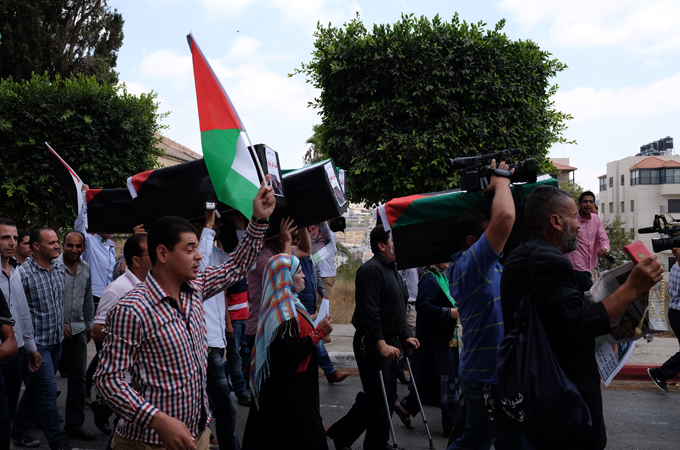Palestinians decry Gaza journalist killings
At least 11 media workers have been killed in Israel’s Gaza offensive, prompting calls for international inquiries.

Gaza City – Hala Hamad first received the news of her husband Khaled’s death in a television report. “My family were telling me, ‘No, it’s not him,’ but I knew [from] his camera and his vest written Press on it,” she told Al Jazeera, breaking down in tears.
Twenty-four-year-old Khaled Hamad worked for a local media company in Gaza City called ‘Continue’ Production Films. He was killed alongside 28-year-old ambulance driver Fouad Jaber when an Israeli tank shell struck the ambulance in which they were travelling.
Keep reading
list of 4 itemsNPR editor resigns after accusing US outlet of liberal bias
Lawmakers brawl as Georgian Parliament considers ‘foreign agent’ bill
Journalist loses foot after being badly wounded in Israeli attack in Gaza
The two were in the hard-hit neighbourhood of Shujayea, as Jaber’s ambulance was one of the first to arrive to evacuate the wounded, and collect the dead bodies.
“I had an unusual feeling, something etched deep in my heart,” said Abu Fouad, about the day his son was killed.
At least 1,865 Palestinians have been killed, and 9,563 others have been injured, since Israel’s military offensive on the Gaza Strip began almost one month ago. Sixty-four Israeli soldiers have also been killed, along with two Israeli civilians and one Thai worker.
Since the war began, at least 11 Palestinian media workers have been killed: Three at different times in the Shujayea neighbourhood, a driver for Gaza news agency Media 24 in an Israeli air strike in Gaza City, and another five were killed while not on duty. The New York-based Committee to Protect Journalists (CPJ) is still investigating the cases of another three reported deaths of journalists.
”My
his camera and his vest written Press on it.”]
“When Fouad was killed, I felt the pain of all the families who have lost loved ones, I felt the agony of separation, I felt how parents feel when they bury their children and return home with an empty heart and empty handed,” Abu Fouad told Al Jazeera.
RELATED: Palestinian journalists under Israeli fire
In the occupied West Bank, Palestinians marched through Ramallah on Tuesday carrying symbolic coffins in memory of the 11 journalists and media workers killed in Gaza since the war began about a month ago.
Cameramen, TV presenters, and photographers headed towards the United Nations building carrying banners calling for the media’s right to safety during war coverage, and holding pictures of their fallen colleagues.
Another group of demonstrators carried a large placard bearing the names of medical staff who were also killed in Gaza.
The Palestinian Journalists Syndicate (PJS), a local affiliate of the International Federation of Journalists, said it has called for an independent commission of inquiry into the deaths of the fallen media workers. “We are awaiting Egypt’s approval to allow three international and six Arab members of this commission into Gaza through the Rafah border crossing,” said Abdel Nasser al-Najjar, the head of the PJS.
The union is hoping that the commission findings could pave the way for prosecutions of those responsible in international courts, Najjar told Al Jazeera.
 |
| Journalists in Ramallah carried symbolic coffins to remember the journalists killed in Gaza [Dalia Hatuqa/Al Jazeera] |
Meanwhile, CPJ has stressed the need to afford journalists the same civilian protections, regardless of the perspective from which they report. “The [Israeli army knows] where media outlets are located in Gaza and must ensure that they are not hit as part of its offensive,” said CPJ Middle East and North Africa Programme Coordinator Sherif Mansour.
The Israeli army said it does not target journalists, and stressed that is in constant contact with members of the news media reporting from Gaza “in order to advise them which areas to avoid during the conflict”.
“As the profession of war and conflict correspondents is extremely hazardous, we advised those that decide to cover the story from within Gaza to avoid placing themselves in any unnecessary danger by working near terror operatives and infrastructure,” an Israeli army spokesman told Al Jazeera.
RELATED: Gaza conflict: journalists under fire?
In Gaza, the Hamad family said that despite their tremendous loss, Khaled succeeded in planting a love for journalism in those close to him: His wife and his sister-in-law, 21-year-old Samira Sheadeh, now hope to follow in his footsteps and take up the profession.
“Khaled [was] killed, but we will continue the message,” said his wife, Hala, who will soon graduate from journalism school. She began studying journalism as a way to share in her husband’s passion for photography.
“They will silence the truth for a day or two,” she said, “but not forever”.
Mohammed Omer reported from Gaza City, and Dalia Hatuqa reported from Ramallah.